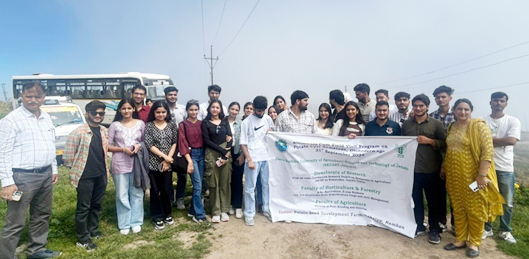news details |
|
|
| Awareness Cum Field visit on Potato Cyst Nematode held | | | 
Early Times Report
Jammu, Sept 22: Under the auspices of SKUAST-Jammu and the guidance of Hon’ble Vice Chancellor Prof. B.N. Tripathi, a field visit was organized for B.Sc. Horticulture II year students from the Faculty of Horticulture & Forestry. This initiative, led by the Directorate of Research, Prof. S.K. Gupta and Dean, Faculty of Horticulture & Forestry, Prof. Vikas Tandon aims to enhance practical skills in identifying the *Golden Cyst Nematode (Globodera spp.)* at the Potato Seed Multiplication Farm, Nathatop (District: Ramban).
As part of their PPE 212 course, focused on nematode pests and management, students actively engaged in hands-on learning by observing and identifying PCN both visually and under the microscope. This practical exposure will stimulate scientific temperament and reinforce their understanding of field symptoms related to nematode infestations. The visit was seamlessly integrated with the harvest of the ICAR-AICRP Nematode trial, allowing students to participate in data recording and analysis, thereby enhancing their research skills.
The *Potato Cyst Nematode* (PCN) or the *Golden Nematode of potato* is a significant quarantine pest of temperate potatoes, first reported in India in 1961 in the Nilgiri hills (Tamil Nadu) restricted to about 4000 ha. It is believed to have been introduced into India from Europe about 200 years ago. Immediately after its interception there, this nematode pest was put under Domestic Quarantine by the Govt. of India. A massive effort was initiated to restrict/eradicate PCN in the Nilgiris. In 1971, the Destructive Insect Pests Act, 1914 was amended by the Tamil Nadu Govt. and Domestic quarantine was imposed in the Nilgiris whereby marketing of seed potatoes out of the Nilgiris was banned. During 1971‒75, the Indo-German Nilgiris Development Project was rolled out. The project aimed to eradicate PCN through a massive and heavy chemical treatment that was made mandatory and free under TN Pest Act 1971.
However, during 2010, potato cyst nematode was also detected in Himachal Pradesh. Subsequently, through sustained efforts made by All India Coordinated Research Project on Nematodes, jointly with SKUAST-Jammu, GBPUAT, Pantnagar, and HPAU, Palampur, PCN was intercepted in several locations in the states of Jammu & Kashmir, Uttarakhand, and Himachal Pradesh.
The declining potato yields in the Govt. Potato Seed Multiplication Farms in these states was traced to the hitherto unknown potato cyst nematodes.
Following this, in 2018, restrictions were placed in specific hot spots identified during pest surveys and sampling conducted by AICRP Nematodes and SKUAST-Jammu, in collaboration with the Department of Agriculture and other state agricultural universities in *Himachal Pradesh* and *Uttarakhand*, due to its considerable impact on potato yields. This pest produces resilient cysts that can be challenging to manage.
Recent updates in *2024* have relaxed certain quarantine measures, including the requirement for *sodium hypochlorite treatments*, reflecting our commitment to balancing agricultural productivity with effective pest management strategies.
This field visit, organized in collaboration with ICAR-AICRP on Nematodes Voluntary Centre, SKUAST-Jammu in the Division of Plant Breeding was facilitated by Prof. Rajan Salalia and Prof. Vijay Bahadur Singh with support from Ms. Seema Bhat, Assistant Programmer who accompanied the undergraduate students. Students are gaining invaluable insights and contributing to the broader objectives of sustainable agriculture and effective pest control in our region.Through this engaging experience, students are empowered to apply their learning in real-world contexts, reinforcing the importance of integrated pest management in horticultural practices. |
|
|
|
|
|
|
|
|
|
|
|
|
| |
| |
|
|
|
|
 |
|
|
|
|
STOCK UPDATE |
|
|
 |
| BSE
Sensex |
 |
| NSE
Nifty |
|
|
| |
CRICKET UPDATE |
|
|
|
|
|
| |
| |
|
|
| |
|
|
|
|
| |
|
|
|
|
|
|
|
|
|
|
|
|
|
